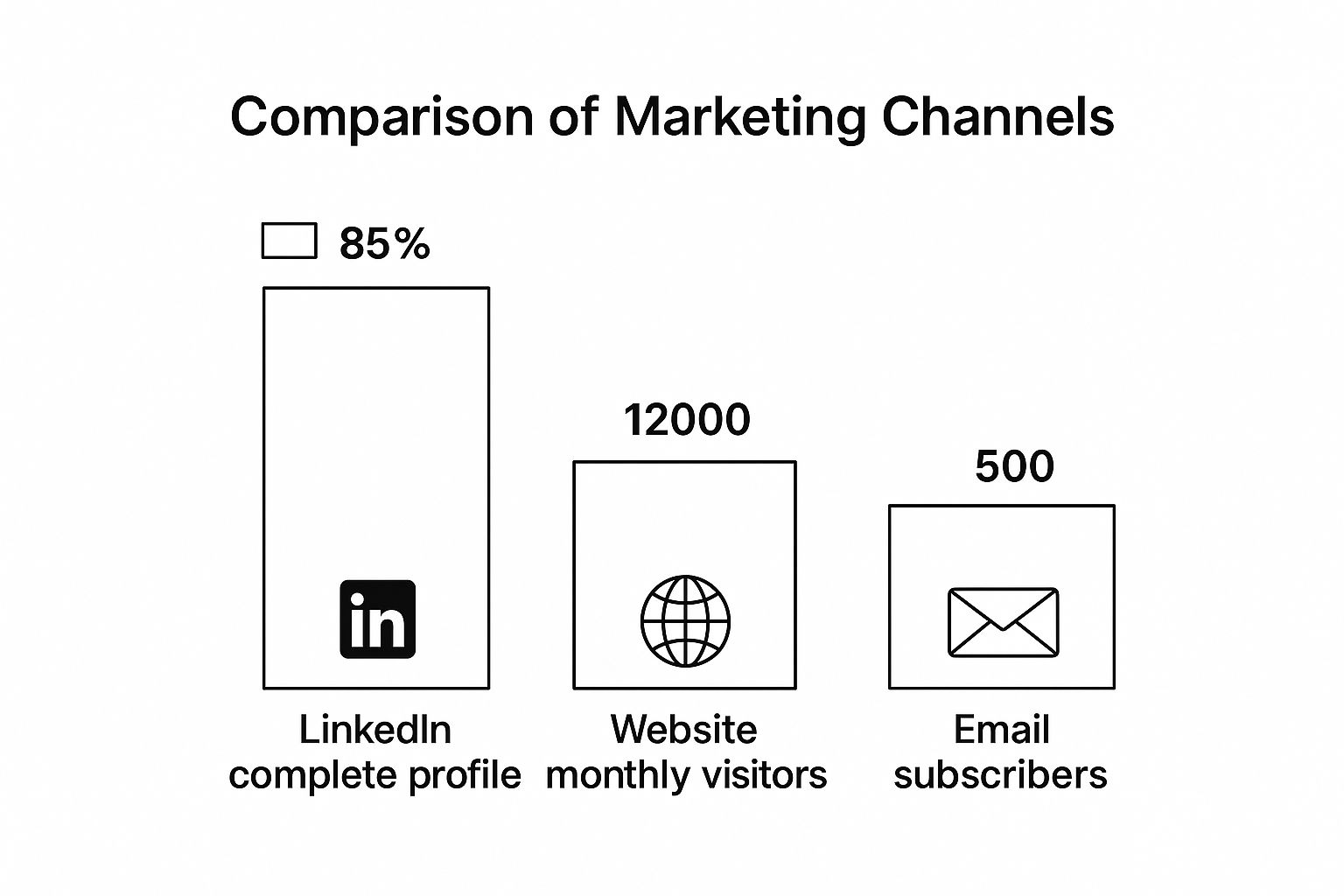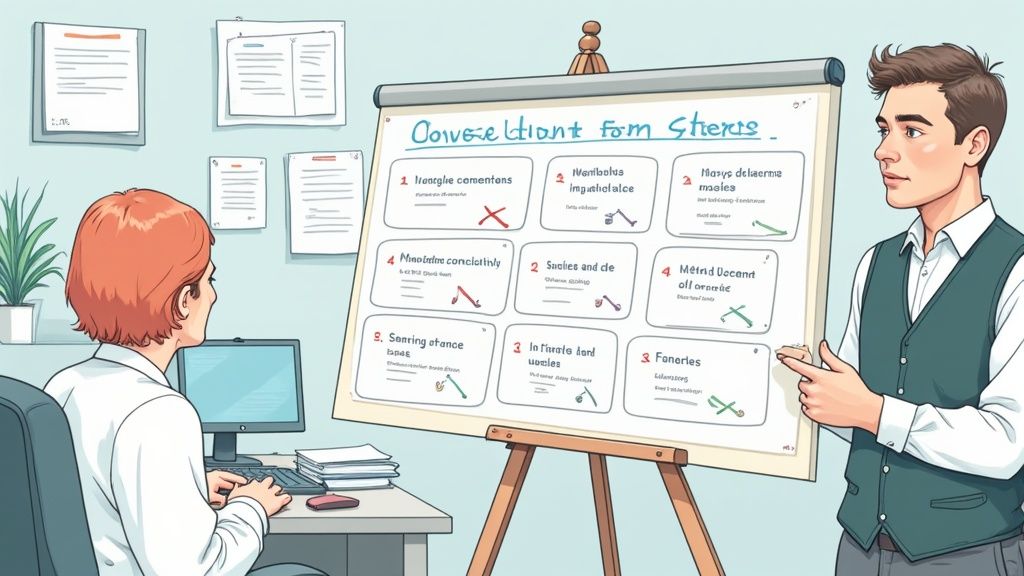Understanding What's Really Happening in Consulting Today

The consulting world is constantly changing. To successfully market yourself, you need a deep understanding of what's driving the market. This means looking beyond the surface and understanding the specific needs of today's clients.
The Shift in Client Demands
Clients are now looking for experts, not generalists. They need consultants who can tackle complex problems with specialized knowledge. This presents a huge opportunity for consultants who can demonstrate deep expertise in a niche area. Highlighting these specialized skills is key to standing out. A proven track record in your niche is even better.
For more statistics on the consulting market, check out this resource: Learn more about the consulting market. The consulting industry itself is booming. The U.S. management consulting market generated about USD 370 billion in 2023. Over 1 million management consulting firms currently operate in the U.S. alone, highlighting the growing demand for these services.
Identifying Lucrative Niches
Some consulting areas are especially hot right now. Digital transformation and operational efficiency are two prime examples. Businesses increasingly rely on technology and are under constant pressure to improve performance. Identifying and positioning yourself in these high-growth areas is critical for success in the long run. But simply following trends isn't enough.
Staying Ahead of the Curve
To really thrive, you need to anticipate what the market will need tomorrow. This means staying informed about trends, finding gaps in the market, and constantly honing your skills. It’s about being proactive, like a surfer anticipating the next wave. This forward-thinking approach is essential for attracting clients and staying competitive. By understanding these dynamics, you can effectively market your consulting services and build a thriving practice.
Creating a Personal Brand That Actually Attracts Clients

The infographic above illustrates the power of different marketing avenues. It compares the effectiveness of a complete LinkedIn profile, website traffic, and email subscribers. Notice the 85% effectiveness rate for a well-built LinkedIn profile. This highlights the importance of a strong online presence.
While website traffic (1200 visitors) and email subscribers (500) are valuable, a polished LinkedIn presence seems to generate significant engagement for consultants. This underscores the need to prioritize your LinkedIn profile when building your brand.
Defining Your Unique Value Proposition
Simply having a profile isn’t enough. To truly shine, you need a unique value proposition. This isn't just a catchy tagline; it's the heart of your brand. It's what sets you apart.
Consider your unique blend of skills, experience, and perspective. What's your "special sauce"? Articulating this clearly is key. For instance, instead of calling yourself a "business consultant," be specific. Perhaps you're "a supply chain optimization consultant for e-commerce businesses." This precision attracts clients actively seeking your particular expertise. Want to dive deeper? Check out this helpful resource: How to master creating your personal brand.
Crafting Consistent Messaging
Your messaging should be consistent across all platforms. This creates a cohesive and recognizable brand. Every interaction a potential client has with you should reinforce your value.
From your LinkedIn profile to your website to your emails, each touchpoint should resonate with the same core message. This consistency builds trust and memorability. Think of it as a thread weaving through your online presence, creating a unified and compelling story.
To help illustrate the different approaches to personal branding, let's examine a comparison table:
Personal Branding Elements Comparison
Comparison of different personal branding approaches and their effectiveness for consultants
| Branding Element | Traditional Approach | Modern Approach | Impact Level |
|---|---|---|---|
| Networking | Primarily in-person events | Online networking & communities | High |
| Content Creation | Limited, often brochures or presentations | Regular online content (blog, video, social media) | Very High |
| Communication Style | Formal, corporate | Authentic, personal | High |
| Self-Promotion | Seen as boastful | Expected and encouraged | Medium |
| Measuring Success | Difficult to quantify | Trackable metrics and analytics | High |
This table highlights the shift towards a more online, authentic, and data-driven approach in modern personal branding. By embracing these changes, consultants can significantly enhance their visibility and impact.
Showcasing Your Expertise Through Content
Content is essential in the consulting world. Creating high-quality content positions you as a thought leader and showcases your expertise. This could include blog posts, articles, videos, or even social media updates.
The key is to offer unique insights. Avoid simply rehashing common knowledge. Instead, focus on providing valuable perspectives and solutions related to your niche. Think of your content as a portfolio, a tangible demonstration of your skills and knowledge.
From Elevator Pitch to Professional Presence
Finally, refine your elevator pitch. This concise summary of who you are, what you do, and who you help should instantly connect with potential clients. Practice it until it feels natural and compelling.
Your elevator pitch is often the first impression, so make it count. By combining a strong value proposition with consistent messaging and valuable content, you create a professional presence that attracts the right clients. This sets the stage for long-term success in the consulting world.
Positioning Yourself Where the Money Actually Is

Smart consultants know that positioning is everything. Finding your place in a high-growth, profitable niche before everyone else catches on is a key to success. This isn't about chasing the latest fads. It's about understanding the market and anticipating what businesses will need tomorrow.
Identifying Profitable Consulting Specialties
Some consulting specialties are simply worth more. Businesses are happy to pay a premium for expertise that directly boosts their bottom line. Areas like sustainability consulting, data analytics, and cybersecurity are booming.
This growth is driven by factors like increasing regulations, the sheer volume of data being generated, and the constant threat of cyberattacks. For consultants, this high demand translates into greater earning potential. The global management consulting market is expected to be worth over USD 457.11 billion by 2032.
This represents a CAGR of 5.27% from 2025 onwards. Companies are increasingly relying on specialists in areas like digital transformation, strategy, and operational efficiency. This continued reliance fuels ongoing market growth. For more detailed market statistics, Explore this topic further.
Transitioning Into Lucrative Niches
Even if your current experience isn't directly in these high-demand areas, you can still make a strategic move. This requires a proactive approach to building new skills. For example, if your background is in project management, adding data analytics skills could position you as a specialist in data-driven project optimization. This combined skill set is extremely valuable in today's data-focused world.
Think about how your current skills can be applied to emerging needs. Perhaps your communication skills could help businesses navigate the complexities of new sustainability regulations. The key is to find the sweet spot where your strengths meet future market demands.
Long-Term Prospects vs. Short-Term Opportunities
Some consulting specializations offer quick wins. Others offer long-term stability and growth. Understanding this difference is vital for building a thriving consulting practice. For example, implementing a specific software solution might be in high demand today. But that demand could disappear as technology changes.
However, the need for process improvement and change management will always exist. Focus on skills that have lasting value, regardless of specific technologies or market shifts. Think long term. Even something as simple as a strong professional photo LinkedIn profile can make a difference in establishing your credibility. This long-term vision will set you up for enduring success in the dynamic world of consulting.
Building a Client Acquisition System That Actually Works
Attracting clients as a consultant isn't about luck; it’s about strategy. It’s about building a client acquisition system that works for you. This means moving beyond sporadic networking and creating a predictable, reliable process for generating leads and converting them into paying clients. This systematic approach is like a finely tuned engine, consistently driving your business forward.
Identifying Your Ideal Client and Their Pain Points
First, define your target market. Who are your ideal clients? What industries do they operate in? What unique challenges do they face? Understanding their pain points is crucial. You need to know the problems that keep them awake at night. This allows you to position your services as the perfect solution, providing relief and real value. For example, if you specialize in Salesforce implementation for small businesses, their pain point might be managing customer data effectively. Your marketing should directly address this issue.
Crafting a Sales Process for High-Value Services
Next, develop a sales process specifically designed for high-value services. This isn't about aggressive sales tactics. It's about building relationships and showcasing your expertise. This might involve offering free consultations, creating valuable content like blog posts or ebooks, or showcasing case studies of your successful projects.
Think of your sales process as a journey. Guide potential clients toward the solutions you offer, building trust and demonstrating your value every step of the way. This approach builds long-term partnerships, not just one-time transactions.
The Power of Relationships and Referrals
Building authentic relationships is essential in consulting. Networking isn't just about collecting business cards; it's about forging genuine connections. These relationships can lead to valuable referrals, which are often the most effective source of new clients.
Referrals come with built-in trust. When someone recommends your services, potential clients are already inclined to see you in a positive light. This makes referrals incredibly powerful for sustainable business growth. Learn more about how to amplify your reach: How to Master Different Marketing Strategies Specifically for Consultants.
Leveraging Testimonials and Case Studies
Don't underestimate the power of social proof. Testimonials and case studies are powerful evidence of your expertise and the results you deliver. They offer tangible proof of your value proposition. Showcase these success stories on your website, in your marketing materials, and during client conversations.
Real-world examples demonstrate your capabilities and build credibility. Potential clients can see firsthand how you've helped others achieve their objectives. This makes your services more tangible and less risky. By building a systematic client acquisition system, you can consistently attract and convert your ideal clients, creating a thriving and sustainable consulting practice.
Mastering Digital Channels Without Getting Overwhelmed

Your online presence is the key to unlocking a stream of new clients. But so many consultants approach digital marketing without a clear plan. This section reveals how to strategically use digital channels to your advantage, without feeling buried by the sheer number of platforms and constantly shifting trends.
Optimizing Your LinkedIn Profile For Lead Generation
LinkedIn offers incredible power for consultants. A well-crafted profile becomes a lead-generating machine. This means going beyond a simple list of your past roles.
Make sure your headline clearly communicates your area of expertise and the value you deliver. Instead of "Consultant," try something specific, like "Supply Chain Consultant Helping E-commerce Businesses Reduce Costs." This targeted approach attracts clients actively searching for your specific skills.
Use your summary to tell a captivating story about your background and how you solve client challenges. Showcase your successes and highlight the transformations you've helped clients achieve.
Creating Content That Positions You As A Thought Leader
Content creation is essential for marketing yourself as a consultant. But it shouldn't take over your life. Focus on quality over quantity. Create in-depth articles or videos that tackle specific pain points within your niche. This establishes you as an expert and attracts clients searching for insightful solutions.
Instead of sharing generic information, provide valuable, actionable insights that showcase your unique perspective. This targeted approach builds credibility and magnetizes the right clients. A well-defined personal mission statement can help focus your brand messaging and content. Check out this helpful guide on creating a personal mission statement.
Using Social Media To Build Authority
Social media can significantly expand your reach. Choose the platforms where your ideal clients are most active. Share valuable content and participate in relevant conversations. This builds authority and positions you as a trusted resource.
Think of social media as an extension of your consulting practice. It's a powerful space to share your expertise, connect with potential clients, and nurture valuable relationships.
Effective Email Marketing For Consultants
Email marketing allows you to nurture leads and remain top-of-mind. Avoid generic newsletters. Instead, segment your audience and send targeted emails filled with relevant insights based on their specific needs.
This personalized approach cultivates stronger relationships and boosts conversions. Treat your email list like a VIP group. Offer exclusive content and valuable resources to build loyalty and encourage repeat business.
Measuring What Matters: Tracking Your Progress
Finally, track your progress. Concentrate on metrics that directly influence business growth, like website traffic, lead generation, and conversion rates. This data-driven approach empowers you to refine your strategies and maximize your ROI.
The table below offers insights into the effectiveness of different digital marketing channels for consultant lead generation.
Digital Marketing Channel Effectiveness
| Channel | Lead Quality | Cost Effectiveness | Time Investment | ROI Rating |
|---|---|---|---|---|
| High | Medium | Medium | High | |
| Content Marketing (Blog, Articles, Videos) | High | High | High | High |
| Social Media Marketing | Medium | High | Medium | Medium |
| Email Marketing | High | High | Low | High |
This data highlights the importance of focusing on high-ROI activities like content marketing and email marketing, while still leveraging the power of LinkedIn for lead generation.
By implementing these strategies, you can conquer digital channels and build a thriving consulting practice without feeling overwhelmed. It's all about focusing your energy and maximizing the impact of each platform. This strategic approach ensures you're investing your time and resources where they truly matter.
Scaling Beyond Solo Practice Through Strategic Relationships
Building a successful consulting practice isn't just about landing those first clients. It's about cultivating relationships that bring in recurring business and fuel your growth. This means exceeding client expectations, broadening your influence within existing organizations, and establishing strategic alliances that amplify your impact.
Turning Clients into Advocates
Exceptional client service is the foundation of sustainable growth. When you consistently deliver value that goes above and beyond, clients become your biggest champions. They’re happy to provide testimonials, refer new business, and become repeat clients themselves. This kind of organic growth is far more effective than any marketing campaign. For example, a consultant who helps a client dramatically improve their supply chain efficiency isn't just providing a service; they’re forging a mutually beneficial long-term partnership.
Expanding Within Existing Organizations
After demonstrating your value within an organization, look for ways to expand your work. Successfully completing a project often opens doors to other departments or initiatives. This type of organic growth leverages established trust and minimizes the need to constantly find new clients. Plus, by developing a deep understanding of a client's business, you can identify other areas where your expertise can have a real impact. This positions you as an invaluable partner invested in their continued success.
Building Strategic Partnerships
Creating strategic alliances with other professionals expands your network and opens up new markets. For instance, a financial advisor could benefit greatly from partnering with a marketing consultant. The financial advisor gains access to the marketer's client base, and the marketer can now offer financial planning services to their clients. This synergistic approach benefits both parties and fosters shared growth. To truly excel with online platforms, consider the importance of digital wellbeing. You might also be interested in learning more about purpose-driven branding.
Scaling Strategies for Different Personalities and Goals
Different scaling strategies suit different personality types and business goals. Some consultants thrive on building large teams and creating scalable systems, while others prefer to remain small and provide highly personalized services. Understanding your strengths and aligning your scaling strategy with your personality and objectives is crucial for long-term satisfaction and success. This requires honesty with yourself about your ideal work style and building a business that reflects your values. For example, a consultant who thrives on close client interaction might choose to specialize in executive coaching, while someone who prefers working behind the scenes might build a thriving practice in data analytics. This alignment is key to creating a business that not only generates revenue but also brings you genuine fulfillment.
Key Takeaways
Your journey to becoming a successful consultant starts with a powerful marketing strategy. This section distills the essential elements of building your brand, attracting clients, and scaling your practice into practical, actionable steps. Consider this your personal roadmap to consulting success.
Defining Your Unique Value and Positioning
-
Identify Your Niche: Don't try to be everything to everyone. Specialize in a high-growth area where your unique skills are highly sought after. This focused approach allows you to command higher rates and attract clients seeking specific expertise. Think precision, not generalization.
-
Craft a Compelling Value Proposition: What distinct combination of skills and experience do you bring to the table? Articulate this clearly and concisely, emphasizing the tangible benefits clients gain by working with you. Make it undeniably clear why you are the ideal choice.
-
Position Yourself Strategically: Understand the current market dynamics and position yourself where the opportunities are. This means staying ahead of the curve, identifying emerging trends, and tailoring your services to meet the ever-evolving needs of your clients. Be proactive, not reactive.
Building Your Brand and Attracting Clients
-
Develop Consistent Messaging: Ensure your brand message resonates consistently across all platforms, from your LinkedIn profile to your website to your email communications. This creates a cohesive and memorable brand experience for potential clients. Consistency breeds trust.
-
Create High-Quality Content: Establish yourself as a thought leader by creating valuable, insightful content that directly addresses the pain points of your target audience. Share your expertise generously and demonstrate the value you provide.
-
Build a Client Acquisition System: Move beyond random networking and develop a systematic approach to attracting and converting clients. This involves understanding your target audience, nurturing relationships, and crafting a sales process tailored to high-value services. Think predictable growth, not wishful thinking. You may find inspiration in resources like How to Find Purpose in Life to align your professional goals with your deeper values.
-
Leverage Testimonials and Case Studies: Showcase your past successes by featuring testimonials and case studies. These provide tangible proof of your expertise and the positive impact you have made on previous clients. Let your results speak volumes.
Mastering Digital Channels and Scaling Your Practice
-
Optimize Your Online Presence: Cultivate a strong online presence that showcases your expertise and draws in potential clients. This involves optimizing your LinkedIn profile, building a professional website, and engaging strategically on social media platforms. Your online presence is your digital storefront.
-
Utilize Email Marketing Effectively: Nurture leads and remain top-of-mind by sending targeted, value-packed emails to your subscribers. Avoid generic newsletters; instead, focus on providing relevant insights that resonate with their specific needs. Treat your subscribers like VIPs.
-
Scale Through Strategic Relationships: Build strong, lasting relationships with both clients and other professionals. Turning satisfied clients into advocates can generate referrals and recurring business. Strategic partnerships can open doors to new markets and exciting new opportunities. Collaboration is key.
Tracking Your Progress and Adapting Your Strategy
-
Measure Key Metrics: Monitor your progress by tracking essential metrics such as website traffic, lead generation, and conversion rates. This data provides invaluable insights into what's working and where adjustments are needed. Data is your compass.
-
Stay Agile and Adapt: The consulting landscape is constantly evolving. Be prepared to adapt your strategy as needed. Stay informed about industry trends and remain open to exploring new approaches. Continuous learning is essential for ongoing success.
By focusing on these key takeaways and establishing a strong marketing foundation, you can position yourself for long-term success in the dynamic world of consulting. Your expertise is valuable; make sure the right clients can find you.
Ready to clarify your purpose and build a personal brand that resonates? Visit Henri Den for guidance and resources.





